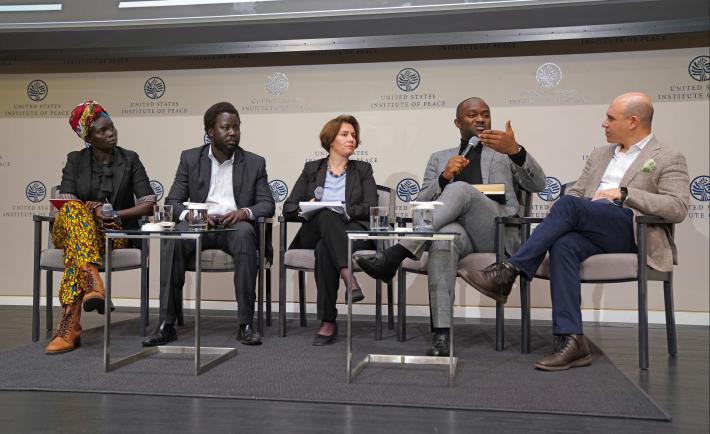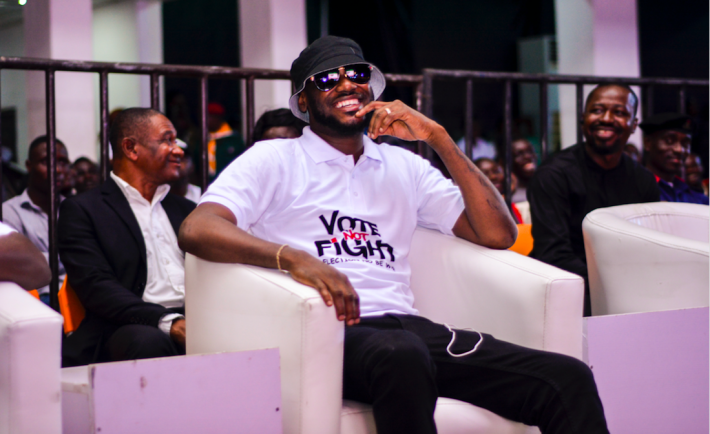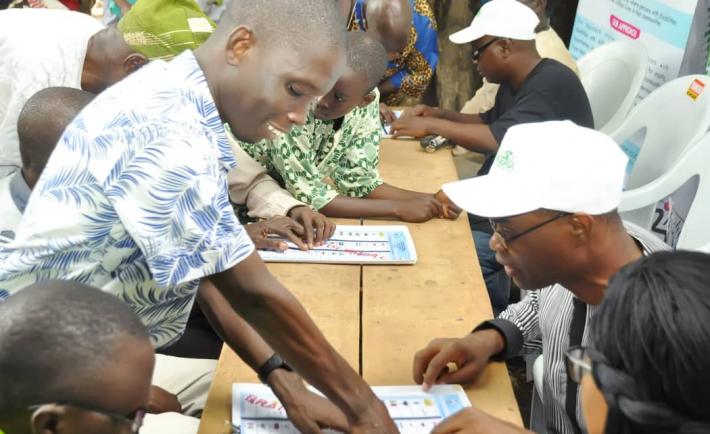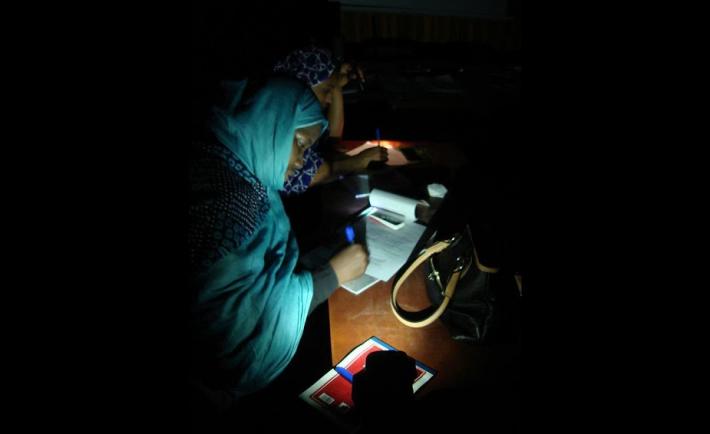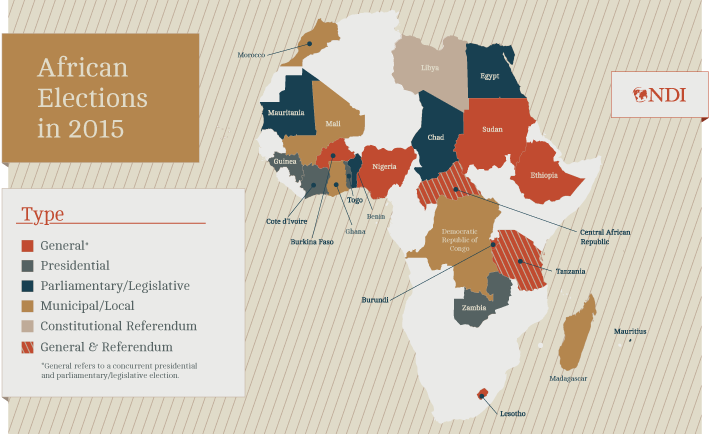In the latest episode of DemWorks, NDI’s Lauren van Metre is joined at the US Institute of Peace by global activists Emna Jeblaoui (Tunisia), Jacob Bul Bior (South Sudan), Samson Itodo (Nigeria) and Aluel Atem (South Sudan). They discuss new thinking about mobilizing good governance and the challenge violent extremism poses to democracy
How can we advance democracy and peace? (w/ Lauren van Metre)
How One Musician Has Used His Voice to Empower Youth in Nigeria During Elections
Election-related violence is a major challenge that Nigeria has been grappling with for a while now. Election related deaths have robbed many citizens of their lives, particularly youth, who have played dual roles as perpetrators and victims.
In An Election Year, Africa’s Largest Democracy Confronts Disinformation Head On
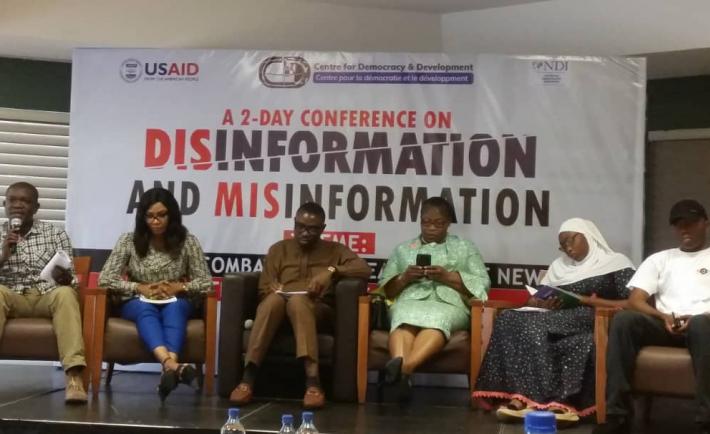
The findings of the "Sorting Fact From Fiction" report were presented at the two-day “Conference on Combating Disinformation and Misinformation” in Abuja
In February 2019, Nigeria went to the polls to elect its President, Vice President, House of Representatives and the Senate facing an exponentially growing volume of news and online information about the election and various campaigns, particularly of President Muhammadu Buhari and his challenger, Atiku Abubakar. Supported by USAID’s Electoral Empowerment for Civil Society Program, NDI worked with local partners in Nigeria at the Center for Democracy and Development to outline what happened online during the election and identify solution driven responses through fact checking, media literacy and research into the online environment.
The Success of Nigeria's Inaugural Braille Ballot Guides
In advocating for strong democratic institutions around the world, it is easy to overlook the rich diversity of democratic traditions across nations. In the United States, presidential hopefuls descend on Iowa every four years to grill steaks for eager caucus-goers. In London, commuters tune to BBC Radio to hear the prime minister and opposition leader spar on issues of the day. And in Nigeria, voters press their thumbs into ink pads, locate the name and party of their chosen candidate, and leave a thumbprint to mark their democratic choice.
Nigerian Disability Advocates Conduct First-Ever Election Accessibility Audits
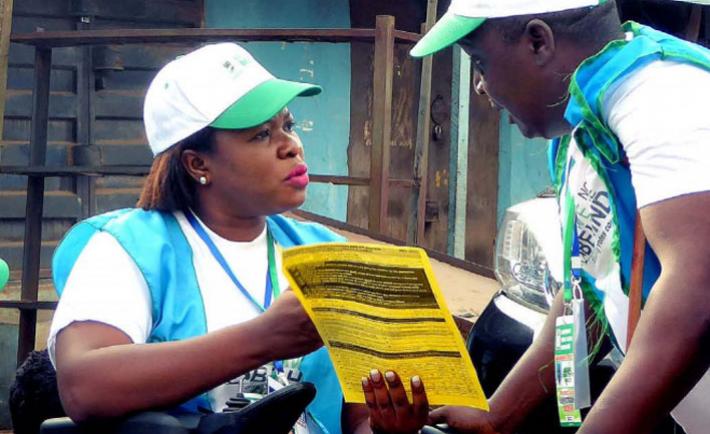
IFA's Grace Jerry (left) discusses the audit checklist with another Access Nigeria observer during an election day deployment.
In Nigeria, there is a dearth of reliable data on the number of people with disabilities, let alone the challenges they face participating in elections. In its World Report on Disability, the World Health Organization estimates that 15 percent of the world’s population lives with some form of disability. Based on this report, IFA approximates that there are 25 million Nigerians with disabilities.
For this reason, disability rights organization and NDI partner Inclusive Friends Association (IFA) audited polling unit accessibility during off-cycle gubernatorial elections in Edo (September 2016) and Ondo (November 2016) states, using a sample-based observation deployment methodology similar to parallel vote tabulation. The audits assessed the availability of handrails, ramps, braille or tactile ballots, written voting instructions and sign language interpreters. Armed with these newfound statistics, disability rights advocates such as IFA are now better equipped to make advocacy demands on decision makers to address barriers to the political participation for persons with disabilities in Nigeria.
Naija Women on the Rise: Making Every Voice Count
_1_0_0_0_0_0_0_0_0_0_0.jpg)
2017 Andi Parhamovich Fellow, Ashley Dauda, with NDI Chairman and former Secretary of State Madeleine K. Albright at NDI's annual MKA Luncheon.
I recently attended a conference on ‘the Political Economy of Gender and Women’s Empowerment in Africa,’ organized by the School of Advanced International Studies at John Hopkins University. Gretchen Bauer, a Professor of Political Science and International Relations from the University of Delaware, held a presentation on the global ranking of women’s representation in national parliaments. As Bauer passed through the slides of her presentation, I didn’t bother to look for Nigeria since I already knew where we stood on the list globally: 181 out of 191—the lowest in Africa.
“Youth Bulge” is Making Waves In Nigerian Politics
NDI staff Lauren Kitz and Jesper Frant lead YIAGA through a visioning and reflection workshop on its #NotTooYoungToRun campaign.
Margaret Mead is quoted as saying, “never doubt that a small group of thoughtful, committed citizens can change the world; indeed, it's the only thing that ever has.” In late February, I traveled to Abuja, Nigeria to meet with one such group of thoughtful, committed citizens.
The Youth Initiative for Advocacy Growth and Advancement (YIAGA) is one of Nigeria's preeminent youth organizations. YIAGA, along with the Youngstars Development Initiative (YDI), has conducted a very successful advocacy effort to lower the eligibility age to run for elected office in Nigeria. From humble beginnings, the #NotTooYoungToRun campaign has grown into a national movement.
Global Women's Leadership Program Brings Women MPs to World Bank 2016 Fragility Forum
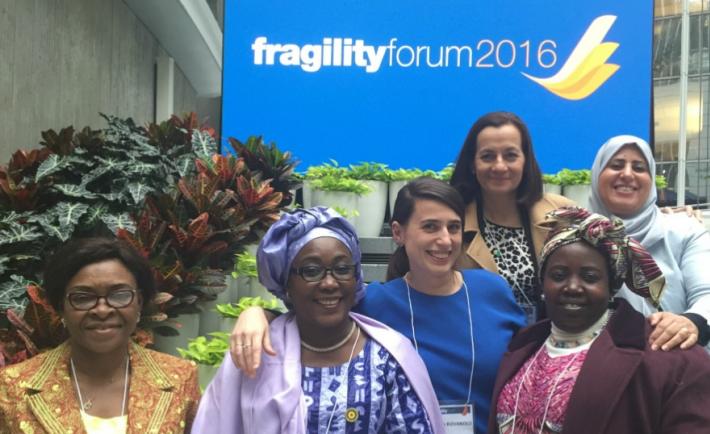
After the delegates' closing remarks at the 2016 Fragility Forum, from left to right: Stella Ngwu (Nigeria), Aissata Toure Diallo (Mali), Besa Rizvanolli (NDI), Clara Rojas (Colombia), Sabina Dario Lokolong (South Sudan), Dr. Sultana Mismari (Libya)
In fragile and violent places, whether it is Colombia, Libya, Mali, Nigeria, or South Sudan, the role of women during crisis, war, and post-conflict reconstruction has been critical. Conflicts often force women to get organized and to safeguard the basic necessities that bolster day-to-day life in each family. They also participate in fighting wars, and in rebuilding their communities. Women act as peacekeepers, relief workers, and mediators. Yet, when peace talks occur, women are not invited to the table and peace agreements are often drafted without the critical perspectives of women.
With this reality in mind, under USAID’s Global Women’s Leadership Program (GWLP), NDI brought a delegation of women members of parliament (MPs) to the World Bank Group Fragility Conflict and Violence Forum 2016 (also referred to as the Fragility Forum) in Washington, DC in early March.
Five Photos That Uncover the Meaning of Democracy
To celebrate this year’s Democracy Day, we asked NDI staff, who support democracy worldwide, to share a photograph that best represents the answer to the question: “What does democracy mean to you?” NDI staff are from more than 60 countries, spanning five continents. Over 100 thought-provoking images were submitted by photographers from all around the world, but the following five stood out.
Six Critical African Elections to Watch in 2015
Between January 2015 and December 2016, African countries will organize more than 35 presidential and legislative elections, and the outcomes have the potential to spark a sea change for the continent. The first of these polls took place in January with the Zambian presidential election after the unexpected death of President Michael Sata.

